Nautical idioms and sailing terms
From “A dressing down” to “Let her rip“, nautical idioms have enriched our language…
101. A dressing down
“Smithies received a proper dressing down from the captain after he failed to secure the bowline properly.” We use this idiom to tell people in no uncertain terms that their performance was inadequate or inappropriate often with aggression and belligerence.
Originally, a “dressing down” referred to a process where old and worn sails we rejuvenated with a bit of TLC, oil and wax in order to increase their performance. Likewise, a sailor underperforming receive a similar, although verbal, “dressing down” in order to increase his performance.
See also “delivering a broadside”.

102. Figurehead
A figurehead is found near the prow of many old sailing vessels. It is often a very ornate wooden carved bust or a full-length figure. It is mostly there for aesthetic purposes and has no real bearing on the performance of the ship.
In today’s language, we refer to someone in charge without real power as a figurehead. For example, a monarch in a democracy or a CEO of a company controlled by the board or the Governor-General.

The origin of the ship’s figurehead was not purely aesthetical but also used as a religious symbol to protect the ship and all that sailed on her. Sailors believed that the ship was an entity on itself and that it would guide them through troubled seas. The ship therefore needed eyes in order to perform this rather wishful notion…
103. Fall foul
If you fall foul of something, then you would have failed in meeting some requirement. For example, falling foul of the law.
There are several nautical examples where fall foul is used, including but not exclusively:
- Ships need anti-fouling to have a clean hull.
- When the anchor rode becomes entangled it is said to be fouled.
- When one ship hinders the advancement of another ship; it falls foul of it.

104. Pooped
It is not known when pooped was used for the first time under its modern meaning: exhausted.
It is used as a verb. For example, “After running for 3 kilometres, Smithies was pooped and couldn’t take another step.”
The origin of pooped is less ambiguous. It comes from the noun “poop deck” which was situated at the back of the ship and in turn, derives its meaning from the French word “la poupe” (stern) or/and from the Latin “puppis”.
It was in many cases the roof of the captain’s cabin and was often the highest deck on the ship. In early naval times. pooped mend that the poop deck was swamped by a wave from a following sea.
Sorry to disappoint…
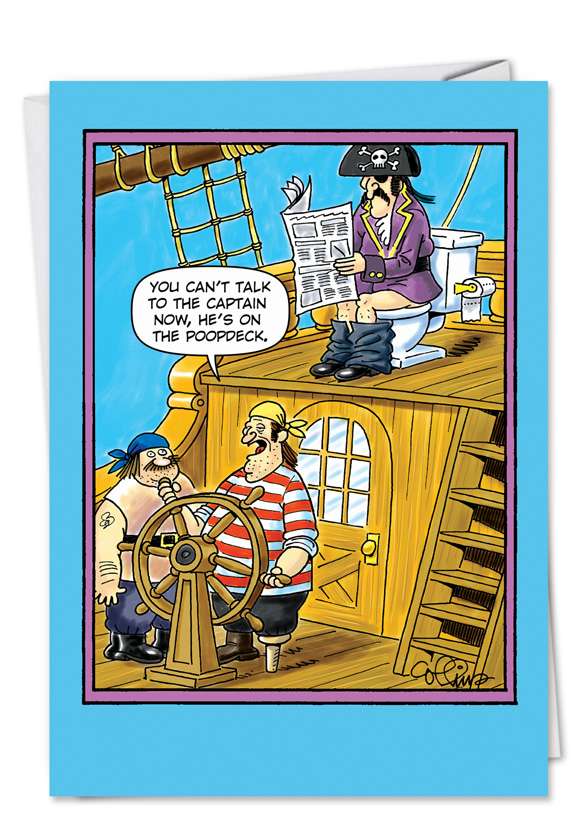
105. Footloose and fancy-free
The bottom of a sail is called the “foot” as opposed to the luff and the leech. The foot runs between the clew and the tack.
When the sheets are released or the boat is pointed too far into the wind, the sail will in essence become a large flag and will luff. This holds true for both sails that are tensioned over a boom via an outhaul as well as headsails which do not have a boom but where the clew is directly tensioned by the sheets.
In the latter example, when this tension is released for whatever reason, (for example, the sheet is released from its cleat or the sheet fails), the sail will start to luff and can be referred to as footloose.
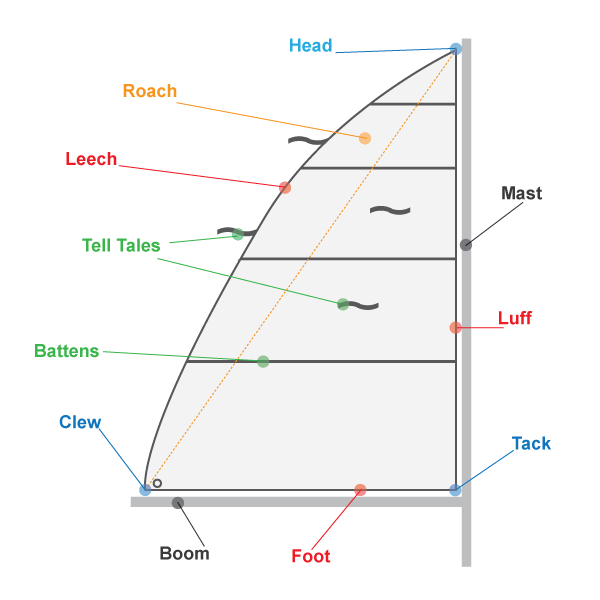
Today, we call someone “footloose and fancy-free” if they are not constrained by being in a relationship. “Smithies was again footloose and fancy-free after he broke up with his girlfriend.”
106. Gripe
In sailing terms, gripe describes when a sailing vessel shows a tendency to turn into the wind whilst close-hauling and where the vessel starts to point into the “dead zone” in which forward movement is halted. This is often caused by an imbalance in sail choice and is also referred to as weather helm. It results in the person on the helm having to work hard trying to compensate for this lack of natural balance.
We use “gripe” to discripe someone who complains, grumbles, moans and groans a lot: not unlike the person on a weather helm…
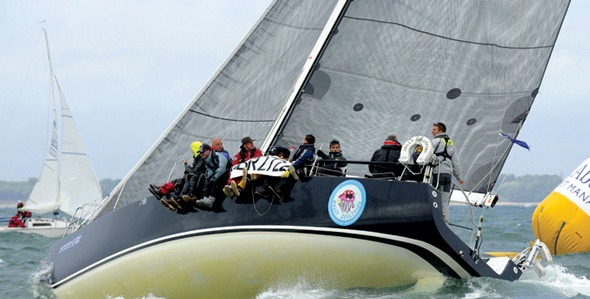
107. Go overboard
If you “go overboard” then you are acting in an enthusiastic or immoderate manner. For example: “Smithies clearly went overboard when he bought 1000 toilet rolls in response to COVID.”
Overboard stems from the meaning of “board” which were wooden planks on the side of a ship constituting what we would now see as a railing.
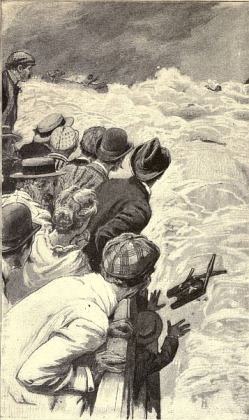
108. Groundswell
Today, we use the word groundswell to denote a political or social agitation or movement. It is often a change in public opinion for the better. For example: “There is a groundswell of support to raise unemployment benefits so people looking for a job can do so with dignity.”
Originally, sailors used to use groundswell to indicate a sudden rise in water which could have been caused by a far-away storm or earthquake. This swell was gradual and slow-moving but imminent and persistent.
109. Windfall
Windfall is one of those idioms that draws its origin from several schools of thought. The general consensus is that fruit that falls to the ground due to a windy day was free for anyone to collect. Others may argue that it is a wind coming down a hill towards the shore providing a sailing ship more leeway. Also, there are some that argue that during the hight of the British Navy oak trees could only be sold to the Navy for a price considered below market value. However, the law allowed a fallen tree uprooted by a heavy wind could be sold to anyone and therefore fetch a better price.
In any case, a windfall is a good unexpected financial suprice. “Smithies found a gold coin on the docks. This windfall didn’t come soon enough as he owed Brutus a debt that he has to pay by tomorrow.”

110. Taking turns
Take turns means that we all have a go at something sequentially to lighten the individual burden of the task.
It stems from “the watch” where sailors had watchkeeping duty aboard ships so that the ship could sail 24 hours per day.
Each watchkeeping period was normally 1 hour. This one hour was measured with an hour-glass. When the watchkeeper was relieved by the next, the hour-glass was turned over in order to start the next watchkeeping period.
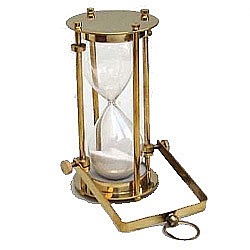
111. First-rate
First-rate ships were ships with a minimum of 100 cannons. There was a scale that rated ships from first-rate (100+ cannons) to sixth-rate (20 to 28 cannons).
Coming back to first-rate ships, they were referred to a ship-of-the-line. They were used to engage with the enemy broadside and in essence produced more firepower than average country’s artillery corps.
So when we refer to a first-rate item, we mean to say that there is none better…
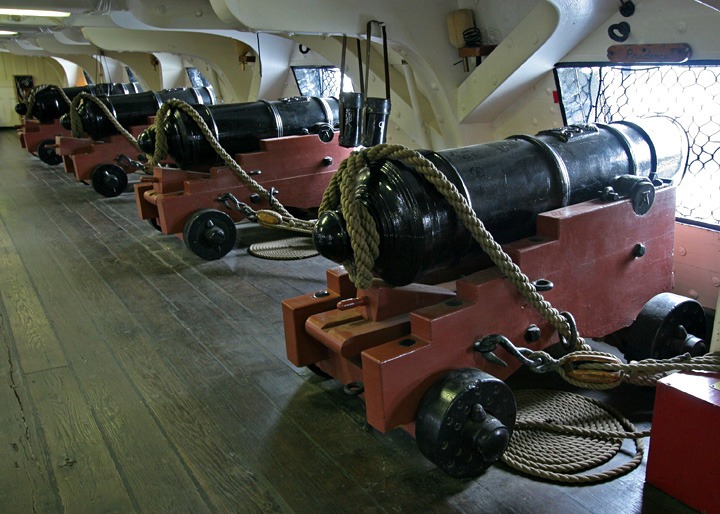
112. Jury rig
Jury rigging is synonymous with a makeshift repair with materials that are at hand. You may say it is the same as MacGyverism for those that remember the MacGyver TV series.
For example, “Smithies jury-rigged a phone charger by using a potato and a lemon.”
Originally, a “jury” is a temporary mast that is rigged to replace a damaged or lost mast.
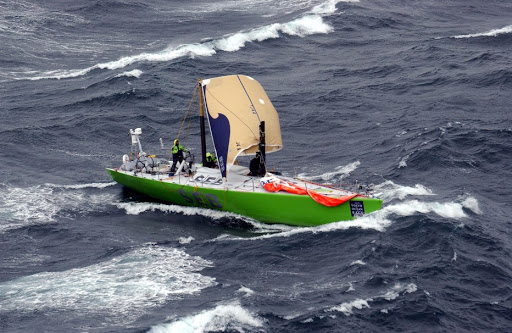
113. Junk
In the age of sailing, there were numerous ropes on a ship. These ropes would deteriorate over time but still provided some value after some repurposing (I do not think this term was used in those days…).
Old ropes could be used again as caulking material to waterproof decks and hulls or to make into boat mops and all sorts of other tools. However, junk was synonymous with a rope that was useless for its original purpose.
Today, junk means simply old or discarded articles that are considered useless or of little value.

114. Skyscraper
In the late 1600s, sailing ships use to rig a skyscraper or skysail which is a sail on the very top of the masts in order to sail the ship in light winds.
It needed to be controlled like any other sail on the ship and deploying it needed someone that didn’t easily shy away from heights…
The etymology of skyscraper is not 100% confirmed but the above origin sounds good enough for at least consideration…

115. Scuttlebutt
The scuttlebutt was a barrel that contained the drinking water for sailors on a sailing ship. The scuttle was the opening so sailors could ladle out the water for consumption.
Sailors used to prolong the time around the scuttlebutt because it was easier to stand around and drink some water compared to scrubbing the decks. It followed that it became the main place on a ship where they could talk to each other about rumour or gossip.
The watercooler: has anything changed in 300 years?
Related: Take someone down a peg or two…
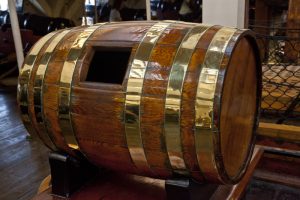
116. Idle
Ship’s crew had several duties, some of which needed to perform during the night such as watchkeeping etc…
However, some crew professions were seen as idle which mend that they did not require to work during the night. For example, cooks.
These crew members were called “idles”. It had nothing to do with the current meaning which refers to idle as not having enough work but rather having plenty of work, just not during the night.

117. Clear the deck
Clear the deck is a Naval command which is given before imminent enemy engagements. Any loose items were stowed away to prevent them from damage or becoming flying objects in the heat of battle.
Today we just mean to make some room or prepare for a course of action by dealing with anything that might hinder your progress. “After the merger, the deck was cleared for major expansion.”

118. On an even keel
A vessel that is sailing smoothly and level is said to be on an even keel. We now use it simply to say that a situation is under control, well balanced and running smoothly.
119. Hulk
A hulk can be either a large ship that is of dubious construction and less than seaworthy. It can also be an old ship that has been stripped of all its valuable assets and is now just moored permanently for purposes such as storage, accommodation or even a prison.
A hulk in today’s language is someone that is very large, awkward, and clumsy. Think of “The Incredible Hulk” or “Hulk Hogan”.
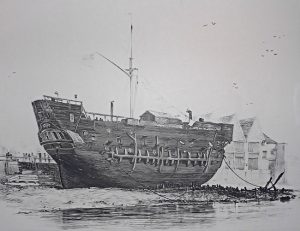
120. Overreach
In sailing, you overreach if you stay on a specific tack for too long. This means that you have gone further than the most efficient route. Perhaps you are now hindered in reaching your next mark in the most efficient manner.
We can also overreach where we take on too much or go beyond what is wise or reasonable.
“When I saw Smithies on the ladder trying to paint the hull of the ship I shouted: don’t overreach, just move the ladder…”

121. Toe the line
Today we “toe the line” when we accept the authority, policies, or principles of a particular entity, especially if we do not want to. For example, “Although Smithies did not agree with the current policy of reduced rum rations, he eventually toed the line in order to maintain a good relationship with the captain.
Literally, when bare feet sailors in the 16/1700s Royal Navy had to stand at attention for inspection or other more formal occasions, they were lined up in neat ranks and files. To achieve this, the deck was marked with distinct lines which were often based on the caulking lines between deck planks. The sailors used these lines fo form an orderly rank by touching the line with their toes thus lining up very straight.

122. Delivering a broadside
Ships-of-the-line were specially designed to come broadside of an enemy ship and deliver as much firepower in the shortest time possible. This strategy was based on the fact that size does matter and particularly the number of guns. Due to the nature of the ship’s shape. all larger guns were deployed to the side of the ship (broadside) and hence this was why the ship needed to come broadside to do apply maximum devastation to the enemy. See also “a dressing down”.
Today, receiving a broadside very much follows the same principle although the cannons are replaced with verbal ammunition…

123. Fits the bill
This is about a Bill of Lading. It is a contract between the seller and the shipper that the goods are in receipt of the shipper and it specifies the goods, the quantity and their condition. It also stipulates the delivery time and other details. On delivery, the buyer would check the goods against his order and against the bill of lading. If all was okay, the goods were said to “fit the bill”.
Nothing much changed in today’s shipping process. The bill of lading is as relevant now as it ever was… The term is an idiom because we now use it to denote that all is good.

124. Press into service
Due to a shortage of crew, the British Navy found new crew by deception or plain kidnapping. This and was referred to as impressment and was executed by press gangs. It is synonymous with shanghaiing or crimping. See “Buttons Up” above…
It is now used to say that something that was obsolete is now again required. For example: “The old black and white TV was pressed into service after the new colour TV stopped working.”
125. Filibuster
The Caribbean Sea in the 17th and 18th centuries was full of buccaneers. They were a type of privateer who prayed on the Spanish merchants and delivered a service that was no different to piracy other than that the British Navy condoned their business model.
The Dutch pioneered the practice. Someone involved was called a “Vrybuiter” and subsequently translated into French as Flibustier.
Today, a Filibuster is a politician that delays or obstructs legislation or policy by perpetually debating the issue.

126. Over a barrel
When sailors were punished they were often tied to a mast, railing or over a barrel.
Today, we find ourselves “over a barrel” or “over the barrel” if we are in a bad situation and are not in a position to better it.
For example: “The offer on my cafe was extremely low but the COVID situation has me over a barrel…”

127. Flotsam and jetsam
When we say, “flotsam and jetsam” we refer to bits and pieces without much value or use.
The expression originates from maritime law and is a legal differentiation between goods discarded from ships.
Flotsam refers to any items that were not deliberately set overboard. For example, where a ship is shipwrecked and debris floats to the closest shore. If you find flotsam then you own it.
Jetsam on the other hand refers to any items that were deliberately set overboard. Ownership of the items will stay with the original owner. This could happen, for example where the captain may discard some cargo to reduce weight and to safe the ship in a heavy storm.
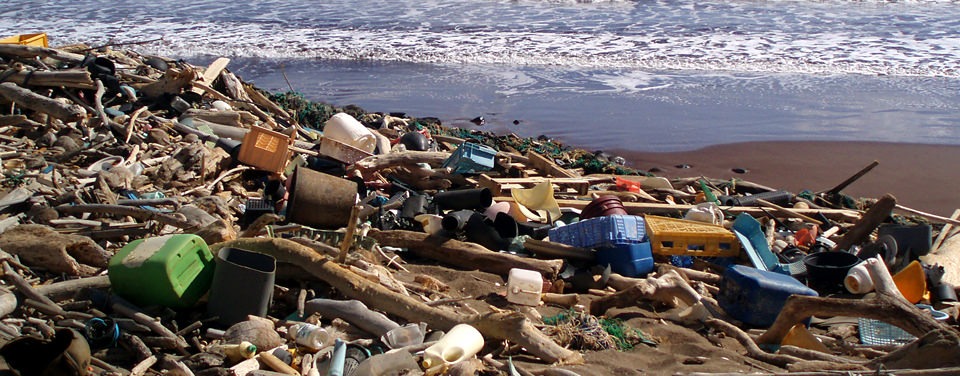
128. Mainstay
The mast is held up by stays and shrouds. This is also known as the standing rigging. The shrouds also serve as rope ladders to allow the crew to climb. A stay that runs from the top of the mainmast to the bottom of the mainmast is called the mainstay.
The idiom is used to denote a person or thing on which something else is based or depends on. For example: “Tourism is the mainstay of Cairns…”

129. From stem to stern
Literally, it means from the front of a ship to the back. It can also be used to describe something in its entirety, from front to back, from one end to the other end, fully.
“He painted the house from stem to stern…”
130. Long shot
A long shot means that there is little chance of success but if achieved will reap great rewards. “He put his last 100 dollar bill on 21 hoping this roulette long shot would get him back in the game…”
In Nelson’s days, the cannons used we notoriously inaccurate. Although not helped by the lack of steadiness of the ship itself, the range and bearing were an educated guess at best. To fire at close range means you are also in close range of the enemy. It was, therefore, advantageous to fire a long shot that had little chance of success but great payoff if it did.

131. Hard-up
When you are hard-up you are in need. This could be financially or any other situation where your needs are not met. For example, “Smithies was hard-up after he lost his job…”
Sailors use to use hard-up to express that they were overwhelmed with ill fortunes and had no way of bettering their lives.

132. Hot chase
A hot chase finds it’s origin in naval warfare. Ships of nations that were not at war couldn’t challenge each other in international waters. Similarly, suspected smugglers could not be challenged when showing the colour of a foreign nation. However, ships that ventured into territorial waters could be challenged and even when chased into international waters were still fair game.
Today, the saying “hot pursuit” is used more often but still stems from the time of sailing ships…

133. Hazing
Hazing is a very old sailor’s tradition and can be best described as an initiation ceremony of such a kind you may expect at a fraternity at university. These initiations were sometimes brutal particularly a specific ceremony when a new sailor first crosses the equator.
“When Smithies joined the company, the boys from the second floor organised a hazing from which he still to recover…”
Hazing is outlawed in most jurisdictions around the world but still happens regularly.

From our friends at the Department:
“Hazing is defined as any conduct whereby a military member or members, regardless of service or rank, without proper authority causes another military member or members, regardless of service or rank, to suffer or be exposed to any activity which is cruel, abusive, humiliating, oppressive, demeaning, or harmful.”wKE
133. In his wake
“Smithies’ love life was rather fluid leaving a trail of broken hearts in his wake…” In his wake, meaning things left behind by someone or something. It may also indicate that you are ahead of the pack. For example: “During the 2000 summer Olympics 400 meters, Cathy Freeman left her competitors in her wake…”
Literally, a wake is a wave pattern produced by a ship caused by the ship’s hull as it moves through the water and displaces volumes of water.


134. Whistle for the wind
Sailors of old had lots of superstitious ideas and whistling for the wind was one of them. Sailors believed that when they were down in the doldrums (without wind or the prospect of wind – see above) they could whistle for the wind in the hope of creating wind. Following on from that idea, you will never hear a sailor whistle when there is a storm brewing.
The idiom morphed somewhat to say “whistle in the wind” meaning that we wish for something we can’t have. For example: “When Smithies applied for the post of the first mate he was whistling in the wind…”
135. Sling one's hook
When you sling your hook, you are getting on your way. You can say: “After an argument, Smithies girlfriend told him to sling his hook…”
One can argue that the origin of this idiom is nautical because sailing ships sling their hook (another word for anchor) just before the ship sets off…
136. Log book
The “common log” was used to measure the speed of a sailing vessel. A wooden piece of wood attached to a rope that had several knots in it a specific measured interval was let out behind the ship. A combination of time and the number of knots let out was recorded as the ship travelling at X amount of knots and was subsequently recorded in the ship’s logbook.
You can read more about why we use knots in sailing in this article: Why use nautical miles and knots in sailing
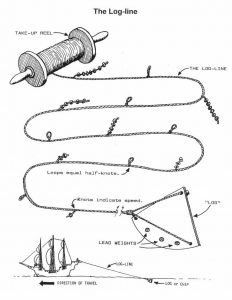
137. Jump ship
There are 2 schools of thought behind the idiom “jump ship” or “to jump ship”.
When a ship is in danger of sinking, the command “abandon ship” may be given after which the sailors jumped ship.
A more likely explanation is that sailors jumping off the ship simply to escape from it. This was specifically the case where sailors were shanghaied or pressed into service involuntarily.
Today, jumping ship means that you give up on, or leave something often suddenly and without warning. For example, “The company’s CEO jumped ship after the royal commission pointed to severe breaches of the law…”
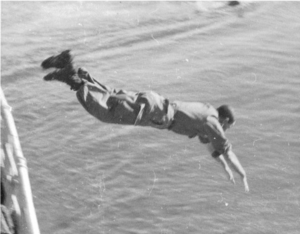
138. Shanghaied
To Shanghai someone means that you force someone to do something they have not willingly signed up to.
The expression finds it’s origin in the practice of recruiting crew into the Royal Navy (press into service) to join a ship lacking a full crew by unconscionable conduct ranging from drugging the potential sailor to deceit or violence.
However, Shanghaiing was specifically referred to when commercial ship owners adopted the same practice. The term “Shanghaiing was probably adopted because a lot of the ship’s destinations were Shanghai (or thereabouts…)
Today, it means simply to coerce or trick (someone) into a place or position or into doing something. For example: “Smithies was Shanghaied into volunteering to organise John’s farewell party…”
139. That ship has sailed
When we say: “That ship has sailed.” we mean to say that some opportunity has passed. You can use it in a sentence like: “Smithies refused 100,000 shares in Google when the company floated but now that ship has sailed.”
It’s origin stems from the fact that sailing ships once cast off where almost impossible to turn around and re-dock due to tide and wind conditions. So when the ship sailed off, there was no more opportunity to board it.

140. Enough to sink a ship
Sinking a ship by overloading it is not that easy to do. So if something is said to be enough to sink a ship it is enormous or very large or in any case more than enough. Also, the alternative, “enough to sink a battleship” is used for the same reason. For example: “Smithies brought enough food to the BBQ to sink a ship…”
141. A sinking ship
The literal meaning of a sinking ship requires no explanation.
Idiomatically, we refer to a sinking ship as stopping your involvement in an enterprise or business which is on a path to imminent failure. Ie, “The CEO of Vidio Easy resigned as the business was driven out of the market by Netflix…”
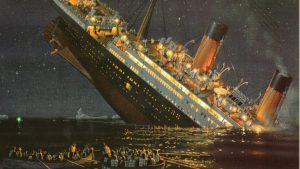
142. Bail out
Bailing out the water was a common practice in the age of sailing as the ships were notoriously leaky. In essence, it kept ships afloat. Bailing pumps are still used for this purpose today.
Figuratively, if you bail someone out it means you help them get out of a sticky situation. For example: “After the financial crisis, the government bailed out several banks despite that extravagant bonuses given to executives…”
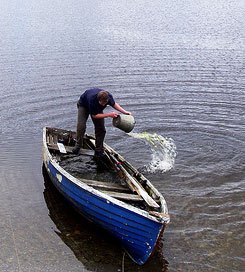
143. Reef the sails
If you reef the sails you most likely do so to slow your boat down and make it less responsive to the wind. This is often done to reduce sail area and thus prepare for more stormy situations.
Outside sailing, it means to slow down or prepare for harder times. For example: “After the election was over, Smithies reefed the sails and relaxed for a bit..”

144. To hit rock bottom
When you hit rock bottom then you are finding yourself in a situation that can simply not get any worse.
“When Smithies shares were declared worthless he hit rock bottom…”
A ship would hit rock bottom where it got stuck on rocks on a high tide. The situation was therefore pretty grim with little chance of recovering the ship.

145. Off to a flying start
The beginning of a yacht race is a flying start as opposed to a start of the 100-meter sprint which starts with the competitors in a stationary position. Although there are many sports that have a flying start like harness racing, yacht racing is said to be the origin of the idiom. It is extremely important to position yourself well and have impeccable timing in order to cross the start line as close to the starting time as possible.
We can use “off to a flying start” when we experience an auspicious beginning of something. For example: ” Collingwood was off to a flying start but still managed to lose the final…”

146. Deep-six someone
To receive a deep-six mend that you would get a burial at sea. Because of the long voyages in the age of sail and the lack of refrigeration, sailors were almost always buried at sea.
As an idiom, we are saying that we want to dispose of someone or something. For example: “After a public backlash, the Minister was advised to deep-six his new policy…”
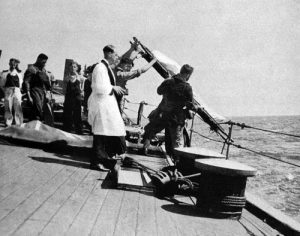
147. Lower the boom
“Smithies lowered the boom on John when he delivered the knock-out punch…” So, lowering the boom means to stop someone by physical force or verbal chastising.
In sailing terms, the boom is arguable from the Dutch “boom” (tree), and is used to extend the foot of a sail. Lowering the boom will effectively stop the ship.

148. Ride out the storm
To ride out the storm means to manage not to be destroyed, harmed, or permanently affected by the difficult situation you experience. For example: “The Labor Party is doing badly in the polls but all they can do is ride out the storm until COVID is under control…”
Riding out a storm is a nautical expression that signifies that the vessel’s captain has chosen not to seek shelter but to persist with his current course of action irrespective of the risk.

149. Full sails
Someone who has “full sails” is going quickly. For example: “Cathy was running full sails when she won the 400-meters…”
In nautical terms, it means the sailing ships had all their sails up to achieve maximum speed to reduce the time of the voyage.
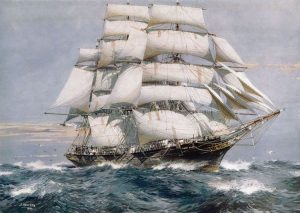
150. Let her rip
The meaning of “let her rip” is less ambiguous than the origin. It means to go as fast as physics allows. As in: “Going around the last corner towards the finish line, Smithies let her rip and won the race…”
Most likely derived from destroying the steam boiler of American steamboats conducting racing activities and putting too much pressure on their machines resulting in the boiler blowing up or ripping.
Do you know any other idioms?
If you have any idioms, expressions or sayings that you think have their origin in sailing or maritime in general then let us know by commenting below. Let’s make this the most comprehensive “sailing did you know” list around…
If you feel there are mistakes in the above idioms then don’t hesitate to say…
Pingback: 200 Nautical Terms and Sailing Phrases That Have Enriched The English Language - Tall Tell Tales
Pingback: Nautical idioms and sailing terms 201-250 - Tall Tell Tales
Pingback: Nautical idioms and sailing terms 151 - 200 - Tall Tell Tales
Pingback: Nautical idioms and sailing terms Part 2 - Tall Tell Tales